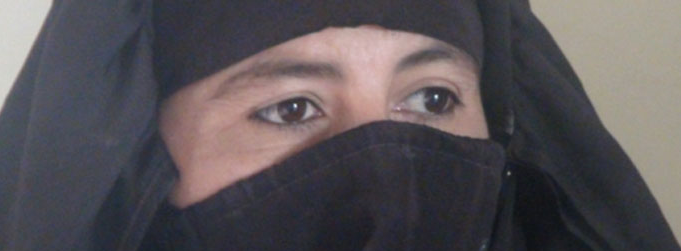Anar Dana has just returned from day 3 of the polio campaign covering more than 50 houses on foot and carrying a vaccine carrier and tally sheets.
She is among few of the female polio workers who walks across the muddy streets in the mostly Pushtun populated villages and urban pockets of Dera Islmail Khan which is also home to thousands of temporary displaced people from South and North Waziristan.

‘On day 1 my team covered 100-102 houses, on the second day 100-106 and on day 3 around 50 houses and on the catch up day we cover the missed children’, explains Anar Dana. Anar Dana along with her family migrated from nearby Tank district in February 2003 and started working as a volunteer with the polio programme in June 2003. After a year she was recruited as a Lady Health Worker (LHW) in the National Programme for Family Planning and Basic Health.
She is 31 now, both her parents are dead and she is responsible for financing her house hold as she is the elder of the family. “During campaign days I get up at 5 in the morning, offer my prayers, prepare breakfast and then rush to be out in the field at 7:30 am, I stay there till 3pm.” Anar Dana is aware of the dangers that comes with the job. She says it’s not without risks to go out in the field and that too with no security. “When your neighbor is killed you may be also killed, these are the risks we are taking in the line of duty.” She says with a sarcastic smile on her veiled face which could been seen in her eyes.
The majority of the people in D I Khan are Sariaki and Pashtu speaking and the general response to the polio programme is considered to be positive but still it’s a deeply conservative society and it is a huge deal for a women to be doing a field job. “I don’t care what people say about me; I focus on my job and generally the community is receptive to our programme and that in itself is a great motivation for me.” She was awarded a cash prize of Rs.200 by district health officials back in 2006. She says this was a memorable day for her when her work was recognized and appreciated. “It was a meager amount of money but the appreciation and encouragement was a big thing for me.”
She doesn’t feel very good the insecurity around her job contract. She thinks it would have been better had she been given permanent job, as she has been in the profession for more than a decade and eager to serve the community for a longer period of time. She also laments the late payment to the polio workers who work in a very hostile environment. She thinks that if there is money available for funding other parts of the polio programme then at least payment to polio workers should be made on time. With all the challenges and issues Anar Dana is keen to continue her commitment to eradicate polio. “I am doing this job to earn money but the most important thing is that its service to the children and our community.”
